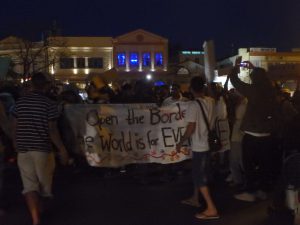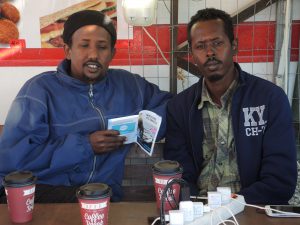 ‘One step forward, hundreds back…’ seems to be the motto under which EU experts implement refugee policy, as currently also demonstrated in Greece. On 8 December 2015, the European Commission published its fourth recommendation on the resumption of Dublin Returns to Greece, this time stating that they could be gradually re-installed, as according to them, refugee rights would be adequately protected in Greece. At the same time, images of people who fled war and are now staying in tents covered in snow are spreading through the global media. Once more, the EU is using Greece to make a point: Dublin has to survive, not matter what, that’s the plan. But in reality, this failed plan has significant consequences, causing one more massive human tragedy in Europe for thousands of people who are escaping war, conflict, disaster, hunger and poverty.
‘One step forward, hundreds back…’ seems to be the motto under which EU experts implement refugee policy, as currently also demonstrated in Greece. On 8 December 2015, the European Commission published its fourth recommendation on the resumption of Dublin Returns to Greece, this time stating that they could be gradually re-installed, as according to them, refugee rights would be adequately protected in Greece. At the same time, images of people who fled war and are now staying in tents covered in snow are spreading through the global media. Once more, the EU is using Greece to make a point: Dublin has to survive, not matter what, that’s the plan. But in reality, this failed plan has significant consequences, causing one more massive human tragedy in Europe for thousands of people who are escaping war, conflict, disaster, hunger and poverty.
Refugees are exposed to snow and rain while forced to stay in tents and unheated prefabricated houses, some of which are old and have broken doors and windows. Over the last days awful pictures from the “Hotspot” detention-camp in Moria on Lesvos have travelled around the world. This time, small tents, not even sufficient for a short summer rain, were collapsing under the pressure of snow and the heavy rains. These pictures where taken by the inhabitants themselves, only a few days after the Greek Deputy Minister of Migration Ioannis Mouzalas had proudly announced that now most refugees would not have to live in tents any more. But refugees and solidarity people alike rose in anger immediately posting photos and videos from camps all around Greece on the internet, demonstrating the opposite. The ‘Winterization’ project failed, during a time when the EU is asserting that Greece is now a safe place for refugees, able to offer adequate living conditions and proper access to asylum procedures.
Greece is not a safe country for refugees. Refugees stuck in Greece are suffering in the inhuman and inadequate living conditions in detention centres and mass camps despite the presence of the UNHCR and numerous international and national NGOs. Refugees lack basic legal rights, access to information and legal aid. They have endured months without access to asylum procedures. They have spent months fighting for their right to stay in Greece while the feasibility of their deportation to Turkey is being examined by the EU’s so-called asylum experts. Hundreds were returned without proper access to legal aid for an appeal against the return decision, without a proper examination of their individual persecution in Turkey, without their asylum claim being heard, without a proper examination of their vulnerability, which should exclude them from any deportation procedure. Their lives have been put on hold on the islands of the Aegean and on the mainland by long-lasting procedures of pre-registration and registration. Access to the asylum procedure is yet not secured as the blocked Skype calls to authorities remain the only way to make an appointment, while thousands of families are separated and have to wait to reunite for almost one year.
Even Greeks are escaping Greece. And so are recognized refugees as there is no welfare system and no labour market, which could offer on the prospect of a dignified life. Even survival is not secured upon receiving the right to stay in Greece as those recognized are excluded even from state housing for refugees and from most of the social support structures offered by NGOs. May we remind you that Greece is suffering for years from a massive economic crisis and all people living here have to cope with the devastating austerity measures forced upon them by the Troika, by our European governments and institutions.
We strongly denounce the EU’s dirty game! The Hotspots are detention centres at the external borders of Europe, meant to select and sort human beings into ‘deportable’ or ‘not-deportable’, ‘migrant’ or ‘refugee’, ‘useless’ or ‘useful’, ‘unwanted’ or ‘wanted’. EASO experts are those who carry out the selection. Frontex is not only the key-institution pursuing militarised controls and the deterrence of “refugee flows” at sea, but also responsible for deportations from the Aegean islands back to Turkey. The Dublin Regulation is a mechanism aimed to keep all refugees at the external borders of the EU. Relocation has failed with only 6,212 persons out of 66,400 successfully moving to other EU-states until the beginning of January 2016 – within the first year of a two-year implementation period. ‘Voluntary’ return is for most people the last choice, and a decision followed the suffering of massive deterrence policies, such as enduring for a year a life in a tent at the rims of Greek society. Refugees give up, finally, preferring to “die at once, than every second again and again” – a sentence that is heard over and over again by refugees in the Greek camps. The cruelty of deportations to Afghanistan is obvious, when we see how European citizens are advised not to go there due to concerns for their safety. Nevertheless, and ironically, the life-threatening situation in Afghanistan is swiftly forgotten when it comes to the granting of asylum to Afghan refugees. The EU-Turkey Deal is nothing more than the result of the blackmailing strategies of a dictator, using Europe’s desire to keep refugees out as leverage.
But Dublin will fall again! Deportations to Greece were already once stopped back in 2011 following the decision of the European Human Rights Court in the case ‘MSS v. Greece’ – and as a result of a long struggle during which many, many refugees escaped from Greece, were deported and escaped again. Some had to flee through Europe 5-6 times. But finally it was over, they succeeded often, and stayed.
Dublin Returns to Greece will be strongly contested in national and international courts again now. As we have seen, the Dublin-regulation has been overrun many times before by the struggles for freedom of movement of individuals and groups.
Mouzalas had to correct himself. We politely suggest the European Commission to do the same.
Refugees are no numbers on a tent, no fingerprints, but people with faces, names and stories!
The Dublin Regulation has to be abolished now.
Human rights violations have to end now.
People have to join their families now.
People have to be in safety and in dignified conditions now.
We therefore demand:
Equal rights for all!
Freedom of movement to all refugees in Greece and elsewhere!
The right to stay for all!
Stop deportations!
No one is illegal!
w2eu – a network born out of the struggle against Dublin returns in 2009
 We the last remaining nine residents of Oraikastro Refugee Camp are PROTESTING against the moving of us to yet another military camp. We understand you have to close the camp.
We the last remaining nine residents of Oraikastro Refugee Camp are PROTESTING against the moving of us to yet another military camp. We understand you have to close the camp. 








